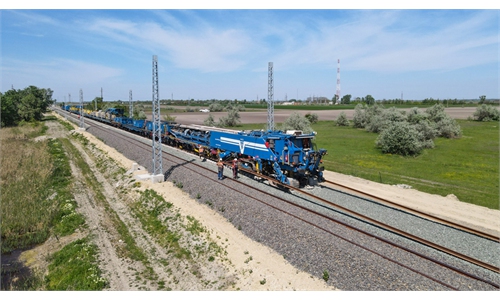China willing to share technology innovation results with partner countries: scholars
China ready to share technology innovation results with partners

Photo: VCG
This year marks the 11th anniversary of the China-proposed Belt and Road Initiative. During the first Belt and Road Forum for International Cooperation (BRF) in May 2017, China announced that it launched the Belt and Road Science, Technology, and Innovation Cooperation Action Plan, which consists of Joint Laboratory Initiative and the Science Park Cooperation Initiative and the Technology Transfer Initiative, among others.In November 2023, the first Belt and Road Conference on Science and Technology Exchange was held in Southwest China's
Chongqing Municipality.
Over the past years, China has collaborated with partner countries to establish more than 50 joint laboratories in fields such as agriculture, healthcare, information, new energy, and basic research, and the country vowed last year to expand the number of joint labs to 100 in the next five years.
The world today stands at the cusp of a new era of technological revolution and industrial transformation, embracing cutting-edge technologies including artificial intelligence (AI), quantum technology, and biotechnology and more.
Thanks to various initiatives under the BRI, China is actively facilitating broader global scientific and technological cooperation and enhancing the innovation capabilities of BRI partner countries, while sharing the fruitful results of the Chinese path to modernization with partner countries.
Those developments strengthen the internal development strength of BRI partners and create new strategic opportunities for the emerging markets globally, thereby enable developing countries to play a greater role in global tech governance.
The world is witnessing an accelerated evolution of profound changes unseen in a century, where the technological revolution and great power competition is intricately intertwined, deeply reshaping the international order.
Against this backdrop, the collective rise of the emerging market economies and the developing countries could drive adjustments to the global governance landscape and also bring new opportunities for the development of the world economy and society.
BRI joint laboratories
The 17th Pujiang Innovation Forum 2024 was held in Shanghai in September, and during a sub-forum themed on BRI cooperation, a number of technology sector insiders from home and abroad have shared their insights on the development of the joint labs under the BRI and the thriving cooperation that complements each other's advantage and leads to win-win results.
The sub-forum was co-hosted by the China Academy of Science and Technology for Development Strategy and other institutes.
It is palpable that the joint labs under the BRI have grown into a premier global platform for shared innovation opportunities and outcomes for all BRI partners. The labs also play a pivotal role in strengthening international sci-tech cooperation, fostering international talent and boosting technology transfer.
For example, the China-Portugal STARLab, a joint lab established under the BRI in 2021, has integrated China's leading space technology with Portugal's strengths in marine research to foster interdisciplinary cooperation.
And, the China-Austria Joint Laboratory for Artificial Intelligence and Advanced Manufacturing integrates China's prowess in digital economy and AI innovations with Austria's expertise in traditional manufacturing.
The joint labs have made breakthroughs such as the landslide geological hazard collaborative monitoring system as well as the 5G Communication and Internet of Things public security system.
Other prominent examples also include China-Kenya Joint Laboratory for Crop Molecular Biology, the Chinese-Egyptian Renewable Energy Laboratory, the China-Laos Railway Engineering Laboratory, and the China-Serbia Joint Laboratory for Natural Products and Drug Discovery.
In addition to what the BRI has been devoted to in the past decade - policy coordination, infrastructure connectivity, unimpeded trade, financial integration and people-to-people ties - the white paper added cooperation in new fields, including green development, new forms and models of digital cooperation, technology innovation, international cooperation in health and more.
Expanding tech cooperation
As part of efforts to boost the high-quality development of the BRI in the next stage, China and the partner countries ought to deepen their cooperation in science and technology innovation under the BRI framework, and continuously explore new dimensions for such cooperation.
And, there is great potential to be tapped in terms of the development of joint labs under the BRI over the next five years.
First, from the perspective of strategic planning, China and its BRI partners should enhance strategic alignment, and upgrade the mechanism of the joint labs step by step to comprehensively elevate the capacity of joint laboratory platforms.
For example, the design of the joint labs should align with the regional and national development strategies of each partner country, and better coordinate with individual countries' resource advantage, innovation environment and the level of cooperation.
Also, all participating countries need to expand and shore up the innovation chain and co-construct their distinctive innovation ecosystems. More cooperation should be initiated in key areas such as AI, life science, green energy, and advanced manufacturing.
Take AI cooperation as an example. As more BRI partners participate in the construction of AI joint labs, the partner countries will have the capacity to further release more application scenarios, thus leveraging a differentiated and complementary effect in fast-tracking the development process.
And, the development of localized AI industry could catalyze more innovations and potentially facilitate the upgrade and transformation of local industries.
The strengthened sci-tech exchange and cooperation under the BRI is conducive for enlarging the voices of the BRI partner countries in the global technological arena, especially benefiting the developing countries.
Facing a myriad of challenges including global economic instability, climate change, and others, the China-proposed initiative is able to galvanize all participating countries to collectively work out sustainable solutions.
Liu Dongmei is Party secretary of Chinese Academy of Science and Technology for Development, and Li Yangyang is a research assistant of the Institute of International Scientific and Technological Relations under Chinese Academy of Science and Technology for Development.



